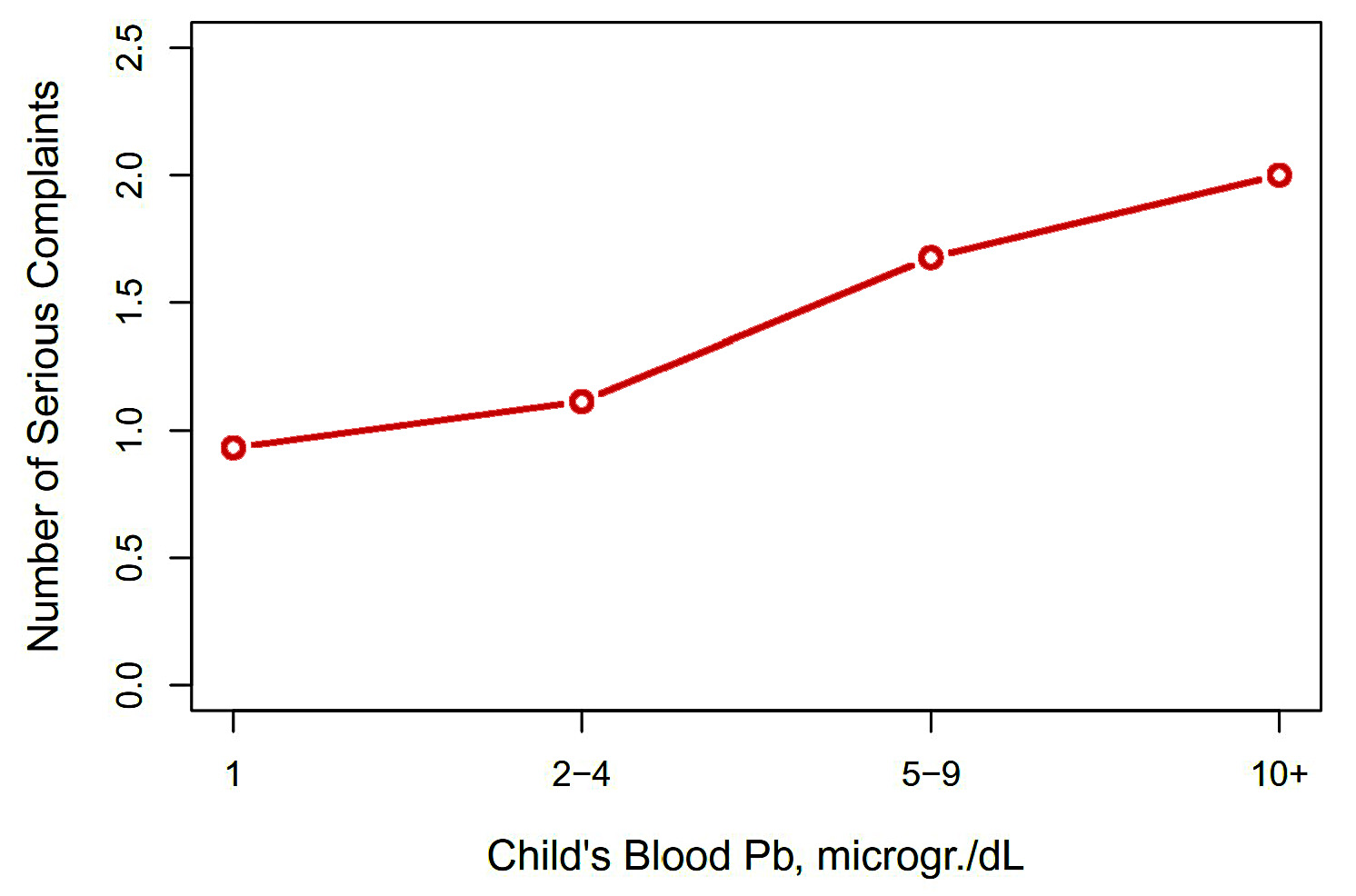A team of researchers recently released a new study of lead and crime based on differences in the lead levels of well water and municipal water in Wake County, North Carolina. This study has two important aspects that make it unusual, but I'll get to that later. First off, here's a brief description.
It turns out that Wake County has excellent records of water service at the residential parcel level starting in 1998. This means that it's possible to find out which families got well water and which got municipal water. This can then be linked with lead testing results among children, which Wake County also has. Long story short, well water had higher lead levels, which means that children who drank well water had blood lead levels about 11% higher than those who drank municipal water.
Next, these children can be linked to records of juvenile delinquency later in life. After a fair amount of interesting statistical jiu jitsu, the researchers concluded that higher lead levels produced higher levels of juvenile delinquency. For example:
 This chart shows that as lead levels increase, so did the number of serious complaints against the children. The authors produced several different results based on different statistical techniques, and all of them show a significant association of high lead levels with high levels of juvenile delinquency. Their primary estimate is that those relying on private wells had a 21% higher risk of being reported for any delinquency and a 38% increased risk of being reported for serious delinquency after age 14.
This chart shows that as lead levels increase, so did the number of serious complaints against the children. The authors produced several different results based on different statistical techniques, and all of them show a significant association of high lead levels with high levels of juvenile delinquency. Their primary estimate is that those relying on private wells had a 21% higher risk of being reported for any delinquency and a 38% increased risk of being reported for serious delinquency after age 14.
So far this seems familiar. As we all know, there are lots of studies showing that lead exposure in small children produces antisocial behavior later in life. But have you figured out the two aspects of this study that make it stand out? All the clues are in the description above.
First, and easiest, is that the results show significant effects even below the usual testing threshold of 5 mg/ul. The effects aren't huge, of course, but they do confirm that even low levels of lead exposure produce negative cognitive effects. Most studies can't do this.
Second, and most important, this is not an ecological study. In an ecological study you compare groups. For example, you might look at when unleaded gasoline was adopted in each of the states and then compare that to crime levels in those states 15 years later. The group you use might be countries, states, neighborhoods, counties, or anything else you can get data for.
This is all well and good, but ecological studies have limitations. The biggest one is that when you compare large groups you never know for sure if there are hidden variables that make your correlations spurious. There are lots of ways of controlling for this, and if you have lots of ecological studies using lots of different groups—as we do with lead and crime—it makes it pretty likely that the results are genuine.
Still, what you'd really like is to study individuals. For example, a famous study at the University of Cincinnati followed children starting at a young age and tested them regularly. That's a prospective study, and it confirmed at an individual level that more lead produced more crime.
There are almost no studies like this, which makes the North Carolina study especially valuable. Using administrative records, the authors were able to follow individual children from well water to blood lead levels to juvenile delinquency.
So there you have it: yet another study of lead and crime that's produced the usual results in yet another way. What's more, there are two experienced criminology professors among the authors, in addition to the usual shady bunch of economists and environmental professors. The criminology community is catching on. Hooray!

What sort of statistical ju jitsu?
dear god this is awful,
Your Herbs and Spices Might Contain Arsenic, Cadmium, and Lead,
https://www.consumerreports.org/food-safety/your-herbs-and-spices-might-contain-arsenic-cadmium-and-lead/
Horrifying, isn't it? I was relieved to learn that the most contaminated spices were those I rarely use, and my favorites tended to be "clean."
Warning to those saying "I'll just grow my own!" CR recommends having your soil tested for heavy metals.
I just threw out the oregano, thyme and turmeric, which I never use anyway.
Was I unconsciously aware of the contamination?
Nearly half the world’s kids are exposed to dangerous levels of lead,
https://www.vox.com/future-perfect/22834666/lead-exposure-poisoning-developing-countries
Looks like you win, Mr. D!!
I think there are socio-cultural reasons that make the correlation not so strong.
Well water houses are more rural, more rural means more poverty, poverty means more crime (not sure if that is true actually). I guess it depends on the county, maybe all of it is rural?
Yeah, that was my immediate assumption.
Do we have any reason to believe that "well water" does not correlate with anything else that might be relevant?
Pingback: New study shows lead in water causes higher levels of juvenile delinquency | Later On